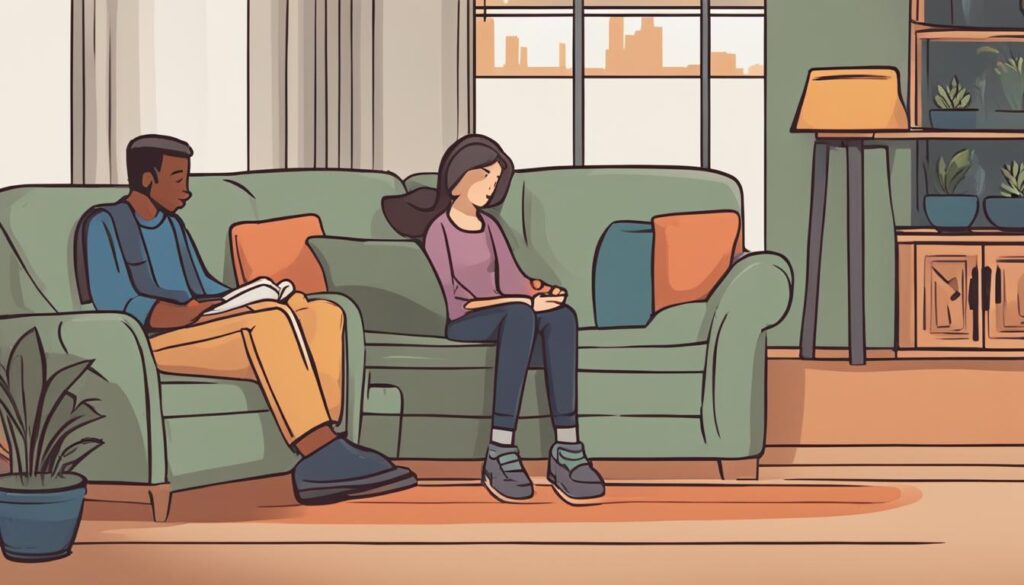Do you find it challenging to navigate the emotional landscape of an introvert? Are you unsure of how to support them without overwhelming them further? Look no further! Let’s see the 8 compassionate tips to help you effectively deal with an emotional introvert and create a nurturing environment that allows them to thrive.
Introverts tend to process emotions and energy differently from extroverts, and they often need space and validation to navigate their feelings and recharge. By following these tips, you can gain a deeper understanding of emotional introversion and develop strategies to support and empower introverts in your life.
Key Takeaways:
- By respecting an emotional introvert’s need for alone time, you provide them with the space to process their emotions at their own pace.
- Validating an emotional introvert’s emotions without minimizing or fixing the situation creates a safe space for them to express themselves.
- Asking gentle, open-ended questions helps you understand an emotional introvert’s thoughts and feelings without pressuring them.
- Offering physical comfort through non-verbal gestures can provide emotional support and solace for an emotional introvert.
- Establishing a signal or code word helps an emotional introvert communicate their readiness for conversation without feeling overwhelmed.
Give Space for Processing Emotions Alone
Emotional introverts often require alone time to process their emotions. Respect their need for solitude and provide them with space when they are feeling overwhelmed or emotionally drained. Understand that their alone time is not a personal rejection, but rather a way for them to recharge and regain their emotional equilibrium.
To illustrate, imagine your friend Sam, who is an emotional introvert, as someone who needs to retreat to their cozy reading nook after a long day at work. This alone time allows Sam to unwind, reflect, and process any emotional experiences or challenges they have encountered. It’s their opportunity to find solace and recharge their internal energy.
Providing space for emotional introverts to be alone doesn’t mean isolating them or leaving them completely disconnected. It’s about understanding their need for introspection and giving them the freedom to take a step back, even if it’s just for a brief moment.
| Benefits of Giving Space |
|---|
| Allows introverts to process emotions at their own pace |
| Helps introverts recharge and regain emotional equilibrium |
| Respects introverts’ need for solitude without feeling rejected |
- Respect the introvert’s need for alone time
- Provide a quiet and comfortable space
- Acknowledge that their need for solitude is not personal
- Refrain from overwhelming them with constant communication or social activities
By giving emotional introverts the space they need, you show them that you understand and respect their unique way of processing emotions. It strengthens your relationship and provides a supportive environment for their emotional well-being.
Validate Emotions Without Minimizing or Fixing
When an emotional introvert expresses their feelings, it’s important to validate their emotions without attempting to minimize or fix the situation. To provide effective support, follow these guidelines:
- Active Listening: Give your full attention and listen attentively when the emotional introvert shares their feelings. Maintain eye contact and provide verbal and non-verbal cues to show that you are engaged. This helps them feel heard and understood.
- Acknowledge Their Emotions: Validate their emotions by acknowledging them without judgment or criticism. Use phrases like “I understand how you feel” or “That sounds really difficult” to show empathy and compassion.
- Avoid Offering Solutions: Unless they specifically ask for advice or guidance, refrain from offering solutions or trying to fix the situation. Sometimes, all they need is someone to listen and understand.
- Create a Safe Space: Provide a non-judgmental environment where they can express themselves freely. Assure them that their emotions are valid and that they are allowed to feel the way they do.
By validating their emotions, you can establish trust and create a supportive atmosphere that encourages emotional introverts to open up and share their feelings. Remember, sometimes the best support you can offer is simply being there for them.

Ask Gentle, Open-Ended Questions to Understand
To better understand an emotional introvert, ask gentle, open-ended questions that invite them to share their thoughts and feelings. By approaching them with sensitivity and respect, you create a safe space for open communication and a deeper understanding of their perspective.
Open-ended questions allow emotional introverts to express themselves freely, without feeling pressured or rushed. These types of questions typically cannot be answered with a simple “yes” or “no” and encourage the introvert to provide more detailed responses.
Here are some examples of gentle, open-ended questions you can ask an emotional introvert to foster understanding:
- “How do you feel about [topic]?”
- “Can you tell me more about what you’re experiencing?”
- “What are your thoughts regarding [situation]?”
- “How does [event] make you feel?”
- “What do you need from me right now?”
Remember to be patient and give the emotional introvert time to process their responses. Avoid interrupting or interjecting with your own opinions or judgments. The goal is to create space for them to express their inner world and feel heard.
Offer Physical Comfort Without Words if Needed
Sometimes, an emotional introvert may find solace in physical comfort rather than verbal communication. Offer a loving touch, a reassuring hug, or simply sit with them in silence to provide emotional support. These non-verbal gestures can speak volumes and convey your understanding and support without the need for words.
Physical comfort is a powerful way to connect with someone who may struggle with expressing their emotions verbally. A gentle touch or a warm hug can provide a sense of reassurance and safety for an emotional introvert. When they are experiencing difficulty or feeling overwhelmed, your physical presence can offer comfort and let them know they are not alone.

Imagine a scenario where your friend, Emma, is feeling emotionally drained after a long day. She is not in the mood to talk and is silently sitting on the couch, looking exhausted. Instead of bombarding her with questions or offering advice, you sit down next to her, place a comforting arm around her shoulders, and offer a gentle squeeze. In that moment, you provide physical comfort and support, letting Emma know that you are there for her without the need for words.
Offering physical comfort can be a valuable form of self-care for emotional introverts. It allows them to recharge and regroup without the pressure of social interactions or verbal communication. By respecting their need for non-verbal support, you help create a safe space where they can find solace and rejuvenate.
| Benefits of Offering Physical Comfort |
|---|
| Creates a sense of connection and support |
| Provides emotional reassurance |
| Gives introverts a way to recharge without words |
| Reduces feelings of isolation or loneliness |
Show Grace Through Emotional Upheavals
Emotional upheavals can be challenging for emotional introverts. During these times, it’s essential to offer them grace and understanding. Avoid taking their emotional reactions personally and remind yourself that their responses are a natural part of their personality. Be patient, provide a listening ear, and refrain from judgment or criticism. Showing grace and empathy helps create a safe and supportive environment for emotional introverts.

For example, imagine your partner, Emma, is an emotional introvert who tends to have strong emotional reactions to certain situations. Instead of getting defensive or trying to diminish her emotions, you understand that this is her way of expressing herself. You give her space when she needs it, validate her feelings, and remain calm and supportive. By showing grace through her emotional upheavals, you help her feel understood and accepted.
| Ways to Show Grace through Emotional Upheavals |
|---|
| 1. Practice active listening and provide a safe space for them to express their emotions. |
| 2. Avoid criticizing or judging their emotional reactions. |
| 3. Offer comfort and reassurance without trying to fix or solve their problems. |
| 4. Be patient and understanding, allowing them to process their emotions at their own pace. |
Seek Counseling to Learn Healthy Coping Skills
If you or someone you know is an emotional introvert struggling with managing their emotions, seeking professional counseling can be highly beneficial. Counseling provides a safe and supportive environment where a mental health professional can guide you in developing healthy coping skills tailored to the introverted temperament. Through counseling, you can learn strategies to navigate your emotions, enhance self-awareness, and promote overall emotional well-being.
Working with a mental health professional specialized in introvert mental health can provide valuable insights and personalized guidance. They can help you explore your introverted tendencies and understand the unique challenges you may face in managing your feelings. By gaining a deeper understanding of yourself, you can develop effective coping mechanisms that align with your introverted nature.
Counseling sessions may involve various therapeutic approaches, such as cognitive-behavioral therapy (CBT), mindfulness exercises, or psychoeducation. These techniques can help you gain emotional resilience and empower you to respond to challenging situations in a healthy and mindful manner.
Seeking counseling for introvert mental health is a proactive step towards prioritizing your emotional well-being. It provides you with a dedicated space to work through your emotions, gain new perspectives, and develop tools to manage your feelings more effectively. Remember, taking care of your mental health is an essential part of leading a fulfilling and balanced life as an emotional introvert.
| Benefits of Counseling for Emotional Introverts | Examples |
|---|---|
|
|
Lead with Empathy and Patience
When dealing with an emotional introvert, it is crucial to lead with empathy and patience. Understanding that their emotional responses may differ from your own is essential in providing the support they need. Approach them with sensitivity and a genuine desire to understand their feelings.
Avoid rushing or pressuring them to express themselves. Allow them the time and space to process their emotions at their own pace. Creating a safe and non-judgmental environment where they feel comfortable sharing is key.
By practicing empathy and patience, you can foster a supportive and nurturing relationship with the emotional introvert, showing them that their emotions are valid and respected.

| Ways to Lead with Empathy and Patience: |
|---|
| 1. Listen attentively without interrupting. |
| 2. Avoid offering unsolicited advice or solutions. |
| 3. Validate their emotions and feelings without judgment. |
| 4. Respect their need for personal space and alone time. |
| 5. Practice active listening and reflect their emotions back to them. |
Express Affection Through Small Acts of Care
To truly support an emotional introvert, it’s important to express your affection through small acts of care. These gestures may seem simple, but they can have a profound impact on their emotional well-being. By going the extra mile to show that you care, you create a sense of security and love that can make a world of difference.
For example, imagine your partner is an emotional introvert who has had a long and exhausting day. You could surprise them by preparing their favorite meal or snack, even if it means putting in a bit of extra effort. This small act of care shows that you understand their preferences and want to provide them with comfort and nourishment.
Another way to express affection is by writing a heartfelt note. Take a few minutes out of your day to write a thoughtful message that acknowledges their emotions and the challenges they may be facing. Let them know that you appreciate their resilience and that you’re there to support them every step of the way. This simple yet heartfelt gesture can remind them that they are loved and valued.
Additionally, offering to do a small task for an emotional introvert can speak volumes. Consider taking on a responsibility that they typically handle, such as doing the dishes or running an errand. By taking this burden off their shoulders, you free up their time and energy to focus on self-care and emotional well-being. These small acts of service show that you are willing to go above and beyond to support them in their daily lives.
FAQ
How can I support an emotional introvert?
To support an emotional introvert, approach them with understanding and compassion. Give them space to process their emotions alone, validate their feelings without minimizing or fixing, ask gentle and open-ended questions to understand them better, offer physical comfort without words if needed, establish a signal for when talking is helpful, show grace through emotional upheavals, encourage seeking counseling for healthy coping skills, lead with empathy and patience, and express affection through small acts of care.
Why is alone time important for emotional introverts?
Alone time is important for emotional introverts because it allows them to process their emotions and recharge. It is not a personal rejection but a way for them to regain their emotional equilibrium. By respecting their need for solitude, you create an environment that supports their emotional well-being.
How should I validate the emotions of an emotional introvert?
When an emotional introvert expresses their feelings, it’s important to validate their emotions without minimizing or fixing. Show empathy and understanding by actively listening and acknowledging their emotions. Avoid offering solutions or advice unless they specifically ask for it. Focus on providing a safe and non-judgmental space for them to express themselves and be heard.
How can I better understand an emotional introvert?
To better understand an emotional introvert, ask gentle and open-ended questions that invite them to share their thoughts and feelings. Avoid pressuring them to divulge more than they are comfortable with. Be patient and give them time to process their responses. This approach encourages open communication and allows them to share their inner world at their own pace.
What can I do to provide emotional support to an emotional introvert?
Sometimes, an emotional introvert may find solace in physical comfort rather than verbal communication. Offer a loving touch, a reassuring hug, or simply sit with them in silence to provide emotional support. These non-verbal gestures can convey your understanding and support without the need for words.
How can we establish effective communication with an emotional introvert?
Establishing a signal or code word with the emotional introvert can be a helpful way to indicate when they are open to talking or would prefer to remain quiet. This signal allows them to communicate their needs without feeling pressured or overwhelmed. Respect their boundaries and only engage in conversations when they are ready.
How should I respond to emotional upheavals in an emotional introvert?
During emotional upheavals, offer grace and understanding to an emotional introvert. Avoid taking their emotional reactions personally and remind yourself that their responses are a natural part of their personality. Be patient, provide a listening ear, and refrain from judgment or criticism. Showing grace and empathy helps create a safe and supportive environment for emotional introverts.
When should an emotional introvert seek counseling?
If an emotional introvert is struggling with managing their emotions, it may be beneficial to seek professional counseling. A mental health professional can provide guidance and teach healthy coping skills that are specific to the introverted temperament. Counseling can help emotional introverts develop strategies to navigate their emotions, enhance self-awareness, and promote overall emotional well-being.
How can I lead with empathy and patience when dealing with an emotional introvert?
Leading with empathy and patience is crucial when dealing with an emotional introvert. Recognize that their emotional responses may differ from your own, and approach them with understanding and sensitivity. Avoid rushing or pressuring them to express themselves. Instead, create a safe space for them to share at their own pace. By practicing empathy and patience, you can foster a supportive and nurturing relationship.
What are some ways to express affection to an emotional introvert?
Expressing affection through small acts of care is a meaningful way to support an emotional introvert. This could be as simple as bringing them their favorite snack, writing them a heartfelt note, or offering to do a small task for them. These gestures show that you care and provide a gentle reminder of your love and support. Remember, it’s often the little things that matter most to emotional introverts.